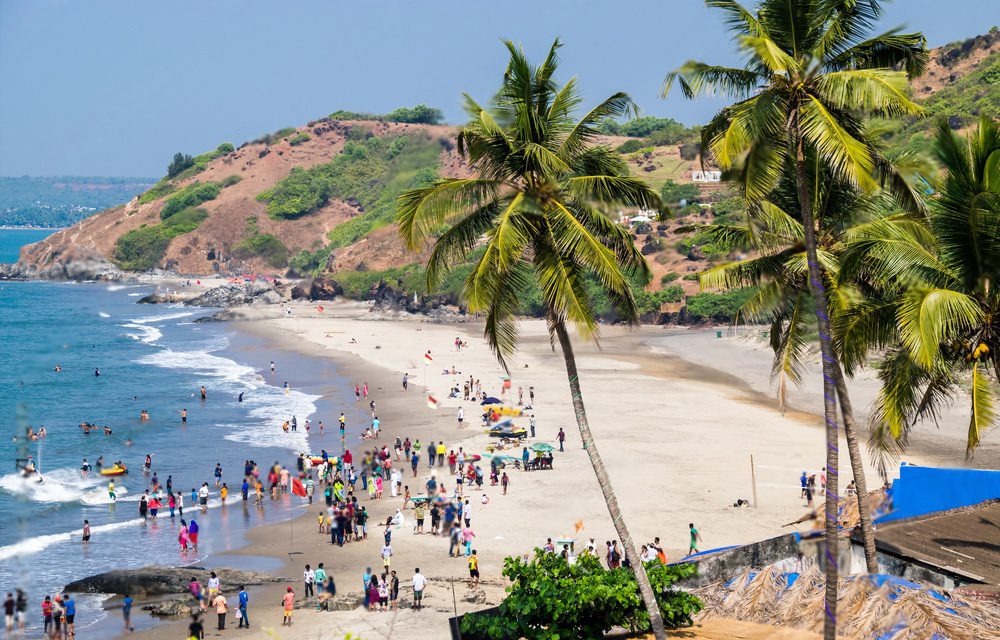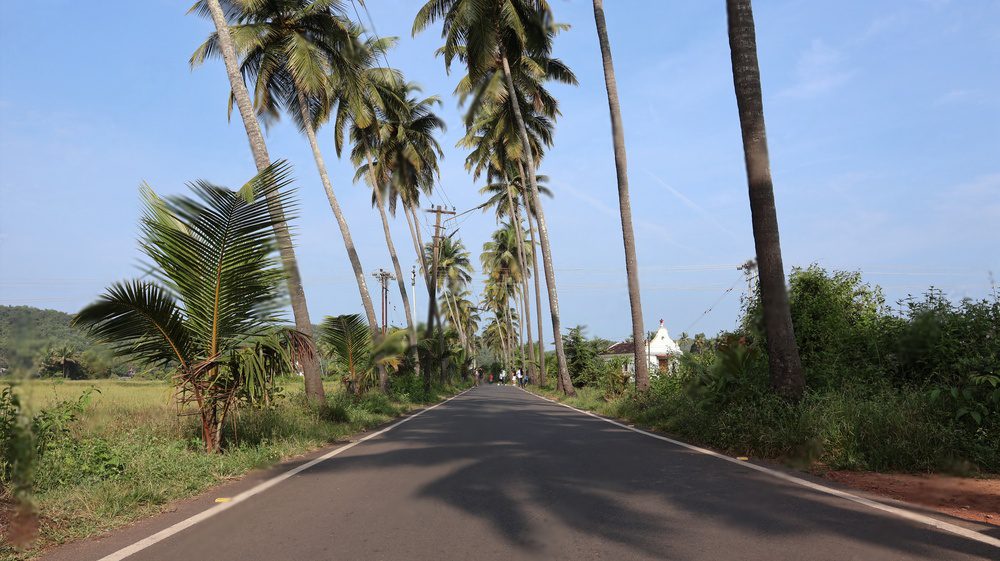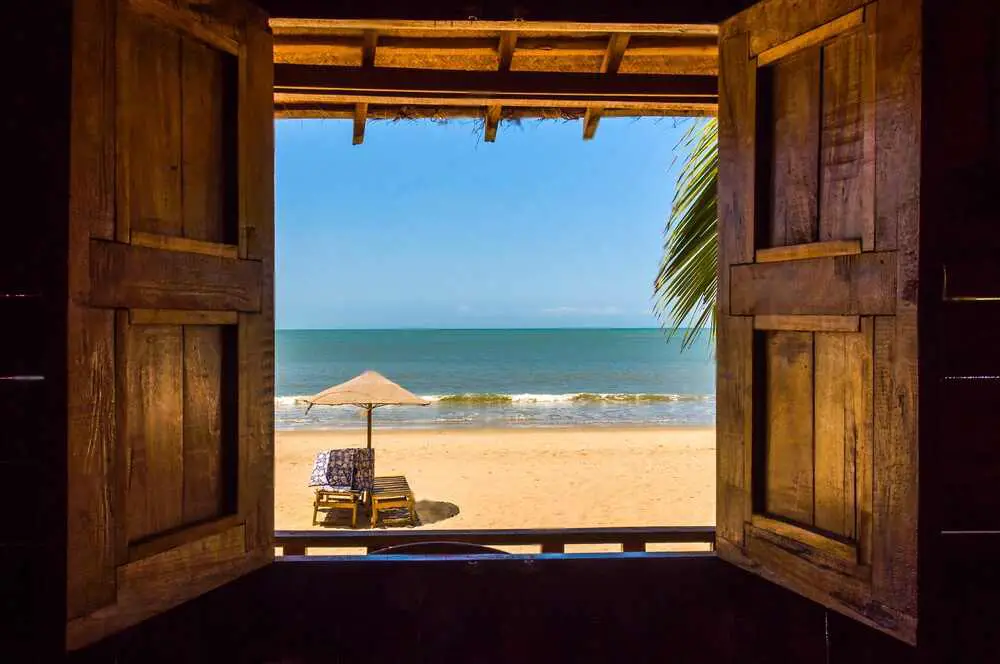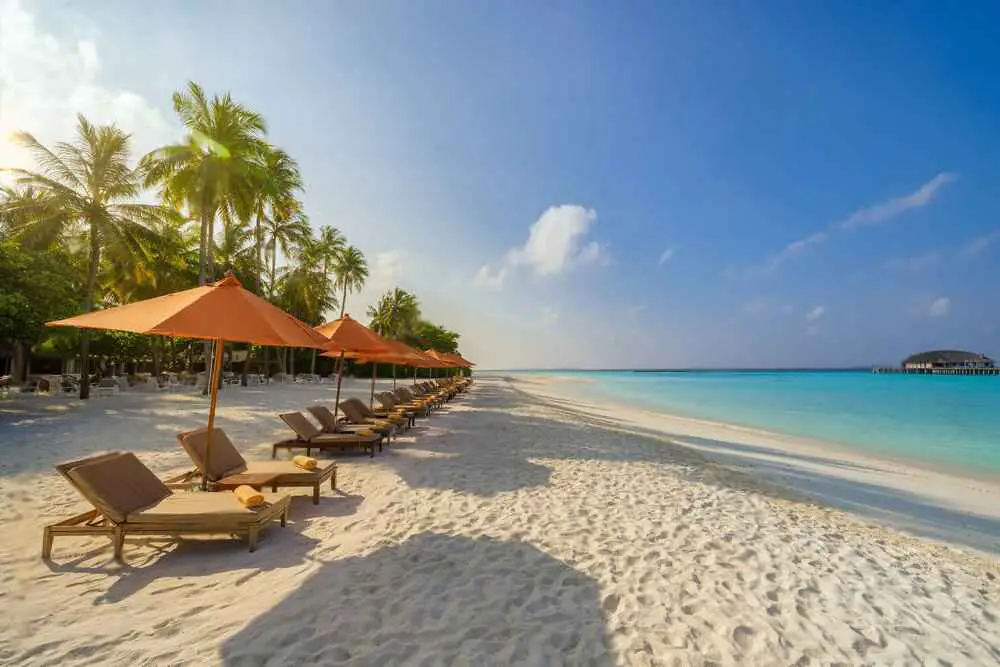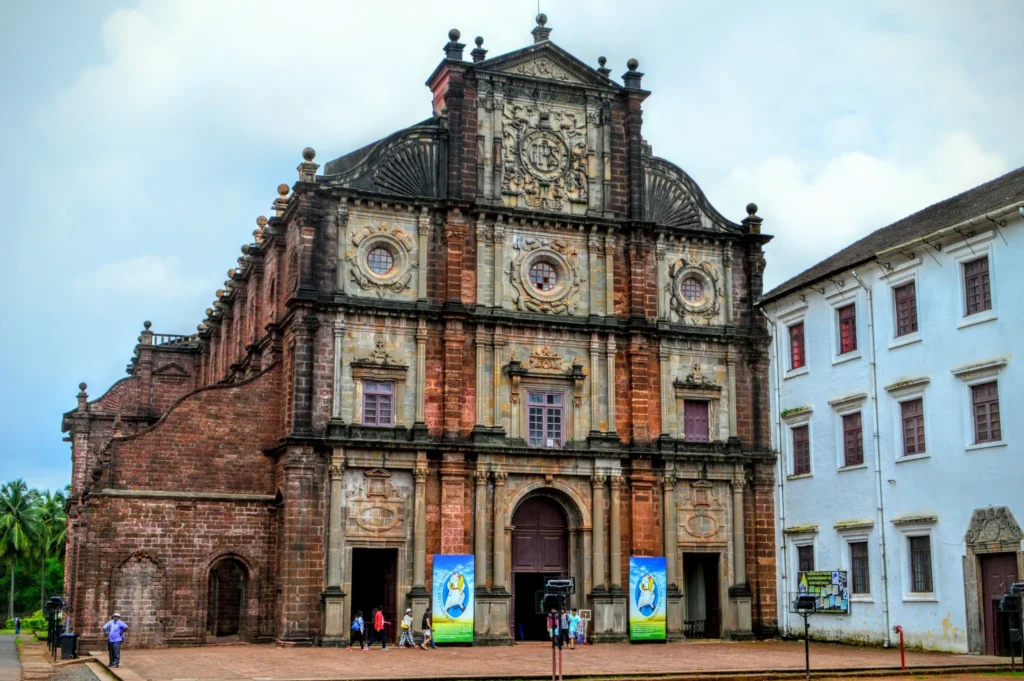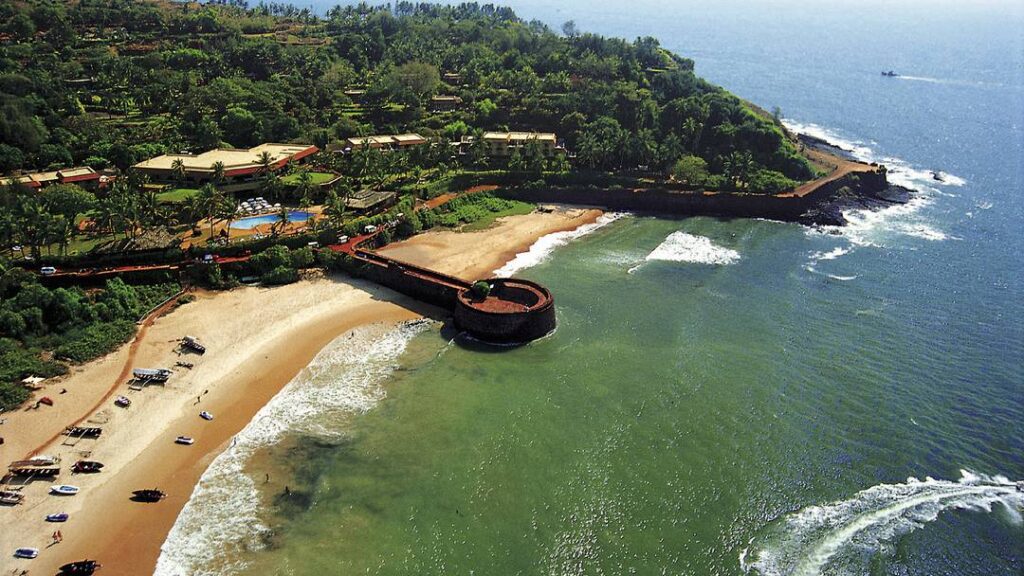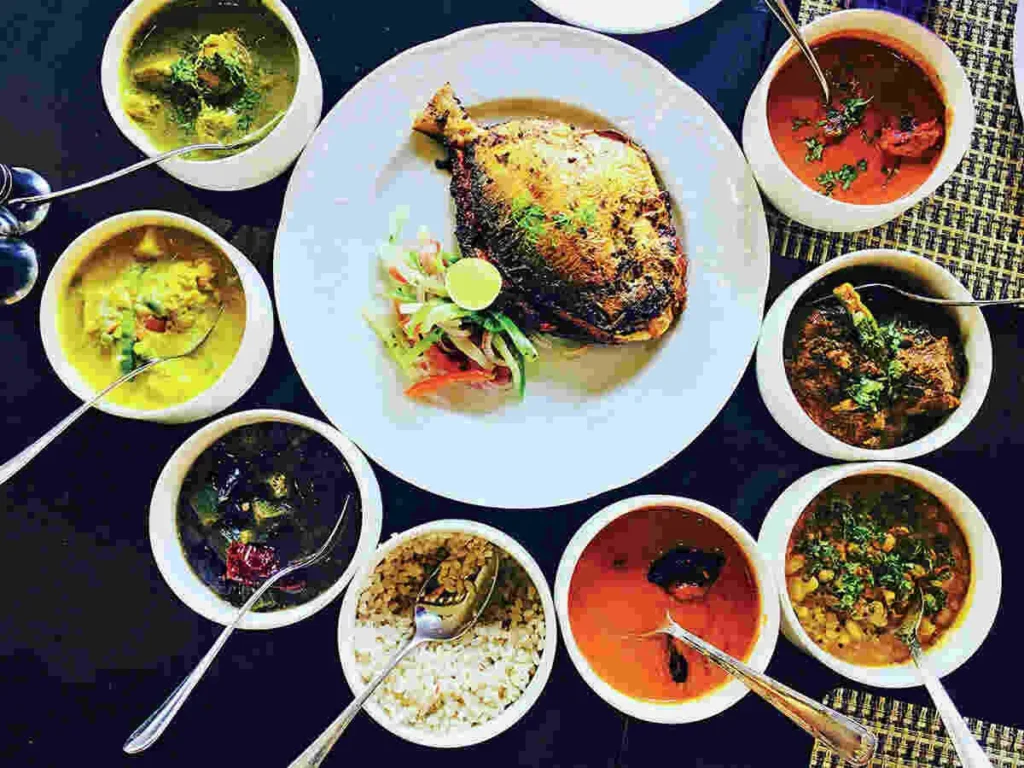Nestled along India’s southern coast, Kerala, often referred to as “God’s Own Country,” is a captivating blend of emerald backwaters, lush hill stations, pristine beaches, and a vibrant cultural heritage. This comprehensive guide by Xplro.com invites you to unlock the secrets of Kerala, providing valuable insights to plan an unforgettable journey
Kerala Unveiled: An Enchanting Introduction:
- Explore the serene embrace of Alleppey’s houseboats and the invigorating treks through Munnar’s misty hills.
- Kerala promises a unique blend of serenity and adventure.
- Discover the vibrant cultural tapestry, from ancient temples to Kathakali performances.
Seasons & Serendipity: When to Embrace Kerala’s Magic:
Monsoon (June-August):


The monsoon season in Kerala, spanning from June to August, heralds a transformative period for the lush landscapes of this coastal state. As the Southwest Monsoon arrives, it brings with it abundant rainfall that nourishes Kerala’s diverse ecosystems, from the verdant Western Ghats to the serene backwaters. While the heavy downpours may pose occasional challenges like flooding and landslides, Kerala’s well-established infrastructure ensures safety and accessibility for residents and travelers alike. Despite the rain, the monsoon season unveils a scenic spectacle, with waterfalls flowing freely, rivers brimming with life, and the aroma of wet earth permeating the air.
Post-Monsoon (September-November):


The post-monsoon period in this State, spanning from September to November, ushers in a delightful transition from the heavy rains of the monsoon season to the crisp, clear days of the dry season. This time of the year is characterized by pleasant weather, with occasional showers interspersed with sunny spells, creating a refreshing ambiance across the state. As the monsoon withdraws, Kerala’s landscapes undergo a remarkable transformation, with the lush greenery of the rainy season giving way to vibrant hues of emerald and gold. The backwaters, rivers, and lakes are replenished by the monsoon rains, offering idyllic settings for boat cruises and houseboat stays.
Winter (December-February):


Winter in State, spanning from December to February, brings a welcome respite from the heat and humidity of the previous months, creating an ideal climate for exploration and outdoor activities. During this time, Kerala experiences mild temperatures and dry weather, with clear skies and gentle breezes prevailing across the region. The lush landscapes of the state are adorned with blooming flowers and vibrant foliage, making it a picturesque setting for travelers seeking natural beauty. Winter is also the peak tourist season in Kerala, with visitors flocking to popular destinations such as Munnar, Thekkady, and Alleppey to experience the region’s diverse attractions.
Summer (March-May):


Summer, which extends from March to May, ushers in warm temperatures and a relatively drier climate compared to other seasons. While the days are generally hot and humid, the evenings bring some relief with cooler temperatures, making it a pleasant time to explore the diverse attractions of the state. Kerala’s landscapes during summer are characterized by lush greenery, blooming flowers, and thriving vegetation, creating a scenic backdrop for outdoor activities and sightseeing. Popular destinations such as Munnar, Wayanad, and Thekkady offer respite from the heat with their cooler temperatures and refreshing hill station vibes, making them ideal retreats for travelers seeking to escape the summer heat. T
Must-Visit Destinations in Kerala:
Munnar, Kerala:


- Nestled amidst the Western Ghats, Munnar is renowned for its lush tea plantations, misty hills, and cool climate.
- Visitors can explore scenic viewpoints like Top Station and Echo Point, trek through pristine forests, and witness the Neelakurinji flowers bloom once every twelve years.
- Munnaralso offers opportunities for adventure activities such as rock climbing, rappelling, and mountain biking.
- The region is home to several wildlife sanctuaries, including Eravikulam National Park, where the endangered Nilgiri Tahr can be spotted.
- Relax and rejuvenate amidst the serene surroundings of Munnar’s tea estates, enjoying the tranquility and natural beauty of this hill station.
Alleppey (Alappuzha):


- Known as the “Venice of the East,” Alleppey is famous for its picturesque backwaters, tranquil canals, and houseboat cruises.
- Visitors can embark on a leisurely houseboat journey through the serene backwaters, passing by lush paddy fields, coconut groves, and traditional villages.
- Alleppey is also home to the annual Nehru Trophy Boat Race, where majestic snake boats compete in a thrilling display of Kerala’s traditional sport.
- Explore the vibrant Alleppey Beach, dotted with swaying palm trees and offering stunning sunset views over the Arabian Sea.
- Dive into the local culture by attending performances of traditional art forms like Kathakali and Mohiniyattam, or savoring authentic Kerala cuisine at local eateries.
Thekkady:


- Located in the heart of the Periyar Wildlife Sanctuary, Thekkady is a paradise for nature lovers and wildlife enthusiasts.
- Explore the lush forests of Periyar, home to a diverse range of flora and fauna, including elephants, tigers, sambar deer, and endemic bird species.
- Enjoy a boat safari on the serene Periyar Lake, where you can spot wildlife drinking at the water’s edge and witness the beauty of the surrounding landscape.
- Thekkady offers opportunities for adventure activities such as trekking, bamboo rafting, and night patrols, allowing visitors to experience the wilderness up close.
- Unwind amidst the tranquil surroundings of Thekkady, breathing in the fresh mountain air and immersing yourself in the natural beauty of Kerala’s hinterlands.
Kochi (Cochin):


- Kochi, a vibrant port city, is a melting pot of cultures, history, and modernity, with a rich heritage spanning centuries.
- Explore the historic Fort Kochi area, known for its colonial-era buildings, ancient Chinese fishing nets, and bustling spice markets.
- Visit iconic landmarks such as Mattancherry Palace, St. Francis Church, and the Paradesi Synagogue, which reflect the city’s diverse cultural influences.
- Witness the colorful Kathakali performances and traditional art forms at the Kerala Kathakali Centre, immersing yourself in Kerala’s rich artistic traditions.
- Experience the culinary delights of Kochi, with its eclectic mix of flavors and cuisines, from fresh seafood dishes to aromatic spice-infused curries.
Silent Valley:
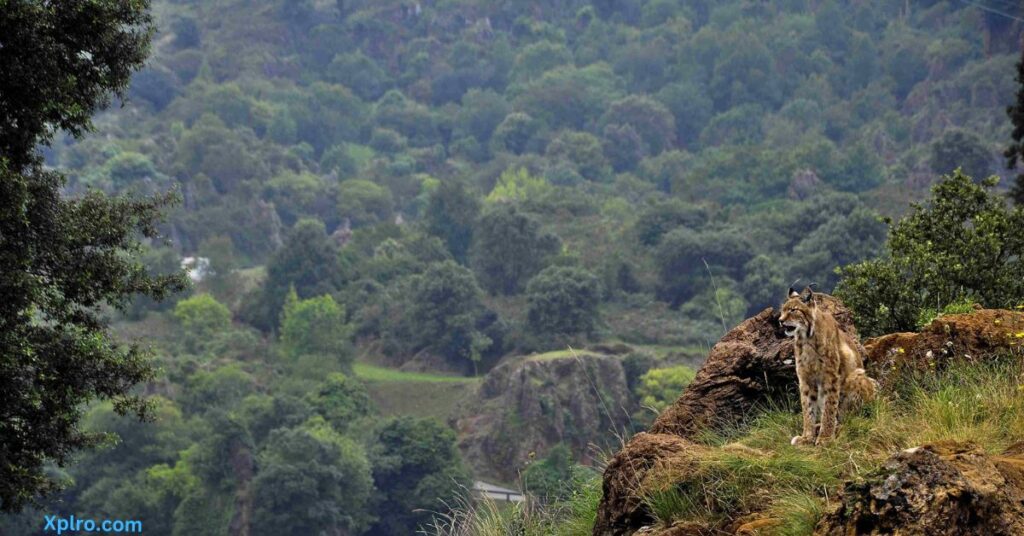

- A verdant jewel within Kerala’s Western Ghats, Silent Valley protects one of India’s last pristine rainforests. Spanning 89.52 square kilometers, this haven explodes with life.
- Over 1,000 unique flowering plants, ferns, and orchids paint the landscape, while elusive tigers and playful lion-tailed macaques call it home.
- The life-giving Kunthi River winds through the valley, nourishing the lush greenery and creating a tranquil paradise for nature lovers.
Wayanad:


- Nestled amidst the Western Ghats, Wayanad is a nature lover’s paradise, offering pristine forests, cascading waterfalls, and sprawling tea estates.
- Trek to the majestic Meenmutty and Soochipara waterfalls, where you can enjoy panoramic views and refreshing dips in natural pools.
- Explore the ancient Edakkal Caves, adorned with prehistoric petroglyphs dating back thousands of years, offering insights into Kerala’s rich archaeological heritage.
- Discover the biodiversity of Wayanad Wildlife Sanctuary, home to elephants, tigers, leopards, and rare species of birds and butterflies.
- Experience the tranquility of Wayanad’s tea and spice plantations, where you can take leisurely walks, sip on freshly brewed tea, and witness the beauty of Kerala’s countryside.
Kumarakom:
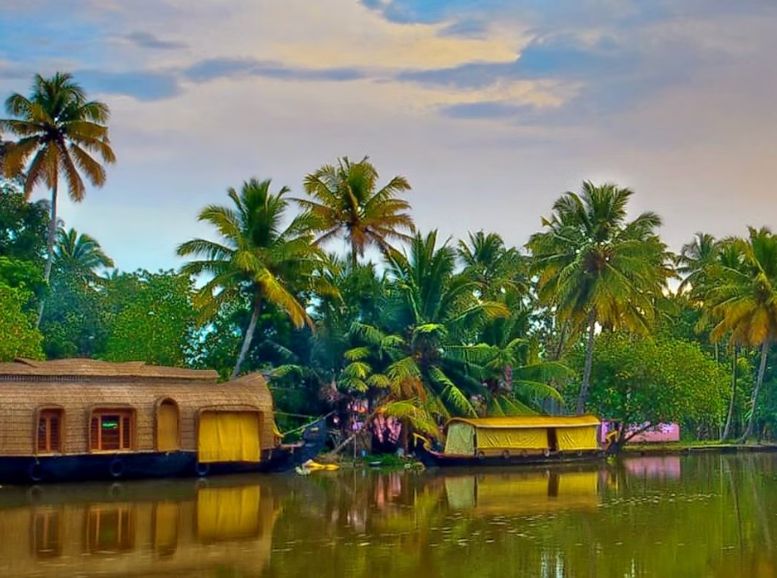

- Nestled on the shores of Vembanad Lake, Kumarakom is a tranquil backwater village known for its idyllic beauty, bird sanctuary, and luxurious houseboat experiences.
- Cruising along the serene backwaters aboard traditional Kettuvallams, visitors can soak in the picturesque landscapes of swaying palms, lush paddy fields, and vibrant birdlife.
- Kumarakom’s serene ambiance, traditional charm, and warm hospitality offer a serene retreat from the chaos of modern life, inviting travelers to unwind and reconnect with nature amidst the tranquil waters of the backwaters.
Kovalam:
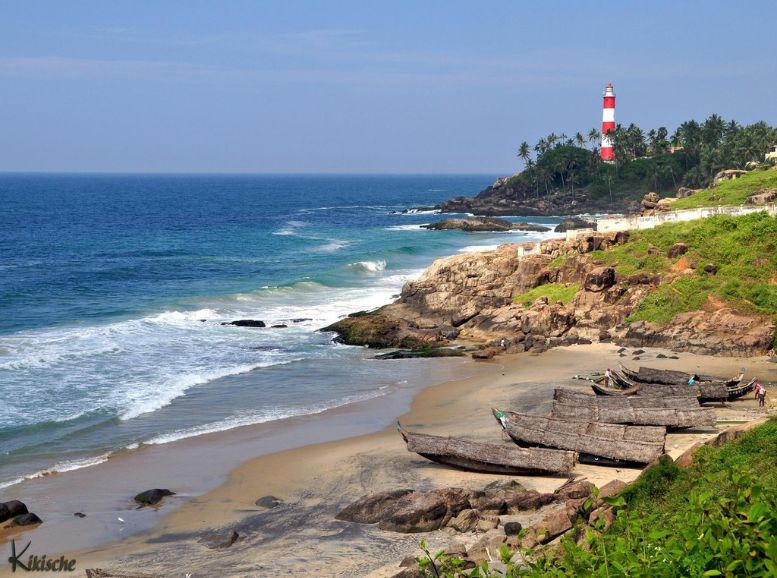

- Situated along the shores of the Arabian Sea, Kovalam is a coastal gem renowned for its pristine beaches, azure waters, and rejuvenating Ayurvedic resorts.
- Whether lounging on the golden sands, indulging in holistic wellness therapies, or partaking in thrilling water sports like surfing and parasailing, Kovalam offers a perfect blend of relaxation and adventure.
- Its laid-back vibe, stunning sunsets, and fresh seafood cuisine make it a beloved destination for beach lovers and wellness seekers seeking solace by the sea.
Varkala:
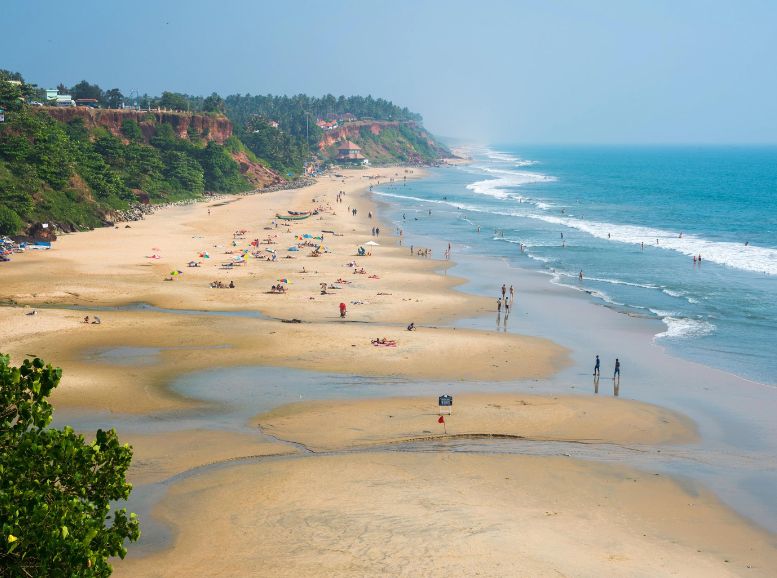

- Perched atop majestic cliffs overlooking the Arabian Sea, Varkala is a coastal paradise known for its breathtaking views, golden beaches, and spiritual allure.
- Whether relaxing on the cliffside promenade, practicing yoga at one of the many seaside shalas, or taking a dip in the natural mineral springs at Papanasam Beach, Varkala offers a rejuvenating escape for body, mind, and soul.
- Its laid-back vibe, stunning sunsets, and eclectic mix of hippie cafes and beachside shacks make it a beloved destination for travelers seeking serenity and solace by the sea.
Athirappilly Waterfalls:
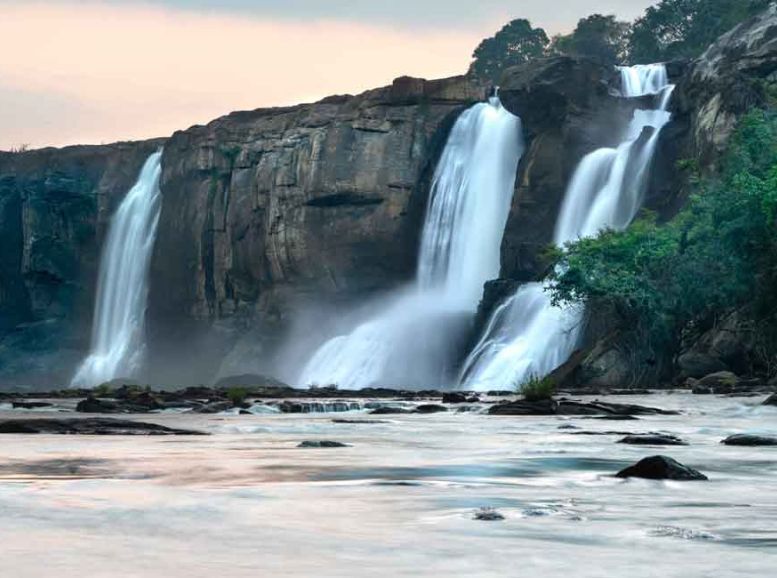

- Kerala’s “Niagara of India,” Athirappilly Waterfalls is a majestic cascade nestled amidst lush greenery and pristine wilderness.
- As the largest waterfall in Kerala, it offers a mesmerizing sight as it plunges from a height of over 80 feet into the Chalakudy River below.
- Visitors can enjoy panoramic views of the falls from various viewpoints, embark on nature walks through the surrounding rainforest, or take a thrilling boat ride to experience the cascading waters up close.
- Athirappilly’s natural beauty and tranquil ambiance make it a must-visit destination for nature lovers and adventure enthusiasts alike.
Kozhikode (Calicut):
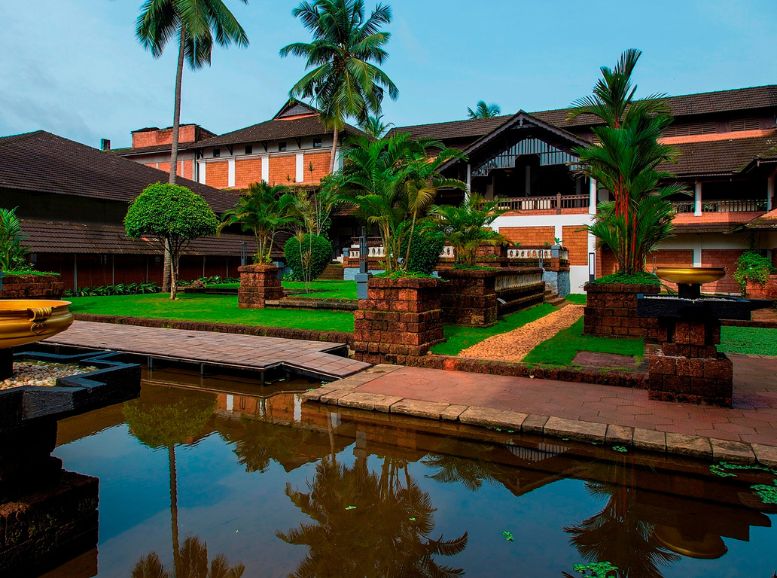

- Kozhikode, historically known as Calicut, is a vibrant coastal city renowned for its rich history, bustling markets, and delectable Malabar cuisine.
- Steeped in maritime heritage, it was once a prominent trading hub for spices and textiles, attracting traders from across the globe.
- Visitors can explore its historic landmarks such as the iconic Beypore Beach, visit the ancient temples and mosques, or indulge in culinary delights at the local eateries and street food stalls.
- With its vibrant culture, scenic beaches, and warm hospitality, Kozhikode offers a memorable blend of tradition and modernity for travelers to savor.
Thrissur:
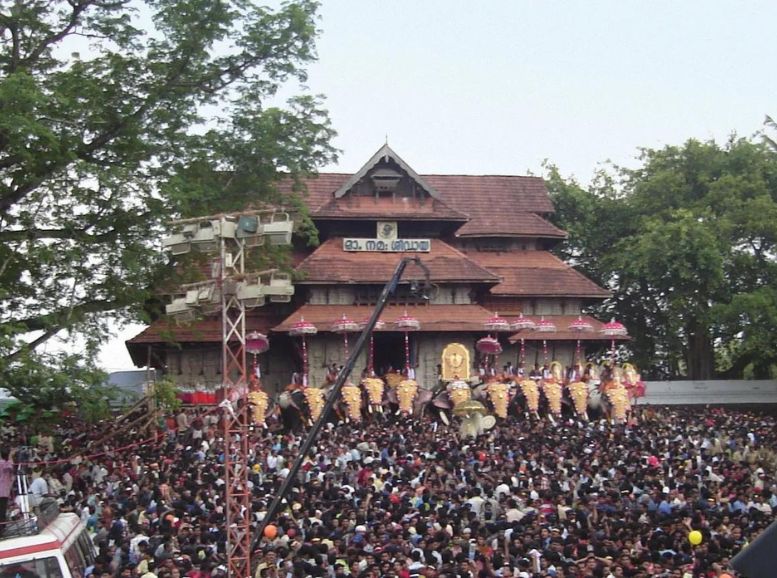

- Known as the cultural capital of this State, Thrissur is a vibrant city steeped in tradition, art, and festivities.
- Home to the iconic Vadakkunnathan Temple, which hosts the famous Thrissur Pooram festival, and the majestic Thrissur Zoo and Museum, the city offers a rich tapestry of cultural heritage and architectural wonders.
- Visitors can witness mesmerizing Kathakali performances, explore the ancient temples and palaces, or stroll through the bustling markets brimming with spices, silk, and handicrafts.
- With its vibrant festivals, historic landmarks, and cultural attractions, Thrissur beckons travelers to immerse themselves in the timeless charm and heritage of Kerala.
Vagamon:
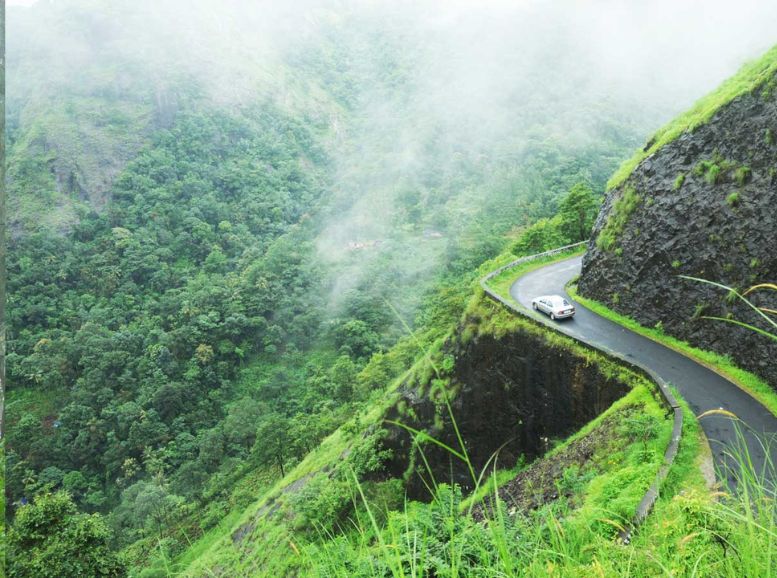

- Tucked away amidst the Western Ghats, Vagamon is a scenic hill station known for its verdant meadows, mist-covered hills, and tranquil ambiance.
- Whether trekking through the lush greenery, paragliding over the picturesque landscapes, or picnicking by the pristine lakes, Vagamon offers a plethora of outdoor adventures for nature lovers and adventure enthusiasts.
- Visitors can explore its quaint churches, visit the serene Pine Forest, or simply unwind amidst the serene surroundings, making it an ideal destination for those seeking solace in nature’s embrace.
Kannur:
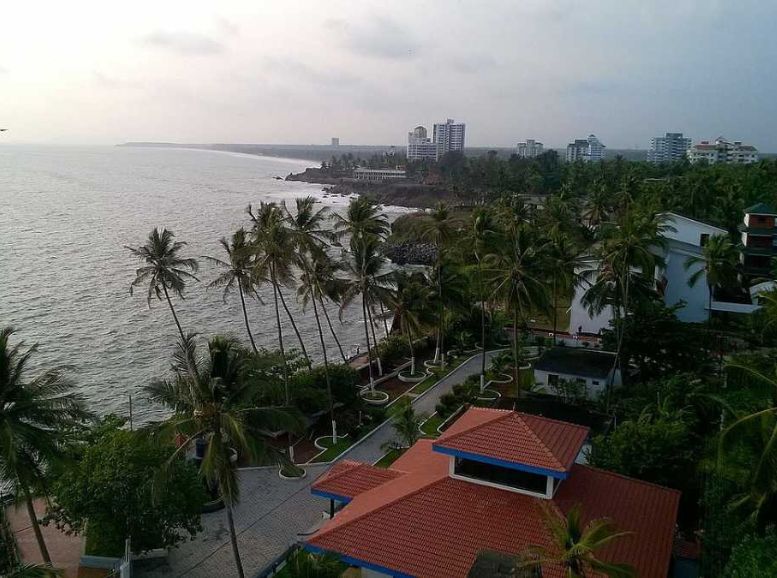

- Located along the Malabar Coast, Kannur is a coastal town renowned for its pristine beaches, historic forts, and vibrant cultural heritage.
- Home to the ancient Theyyam rituals, traditional handloom industry, and exquisite folk art forms, Kannur offers a unique insight into Kerala’s rich cultural tapestry.
- Visitors can relax on the sun-kissed sands of Payyambalam Beach, explore the ancient ruins of St. Angelo’s Fort, or witness the vibrant Theyyam performances, immersing themselves in the vibrant traditions and customs of the region.
Must Try Experience:
- Explore the lush jungles of the Western Ghats.
- Embark on safaris through Periyar Wildlife Sanctuary.
- Discover the tranquil beauty of Marari Beach.
- Cruise Kerala’s backwaters aboard traditional houseboats.
- Experience holistic wellness amidst tea plantations and Ayurvedic retreats.
- Trek through the pristine trails of Silent Valley National Park.
- Indulge in birdwatching amidst Kerala’s diverse ecosystems.
- Witness stunning sunsets over the Arabian Sea from coastal cliffs.
- Discover hidden waterfalls nestled in the heart of Wayanad’s forests.
- Engage in cultural experiences, including Kathakali performances and temple festivals.
Explore Kerala’s Heritage:
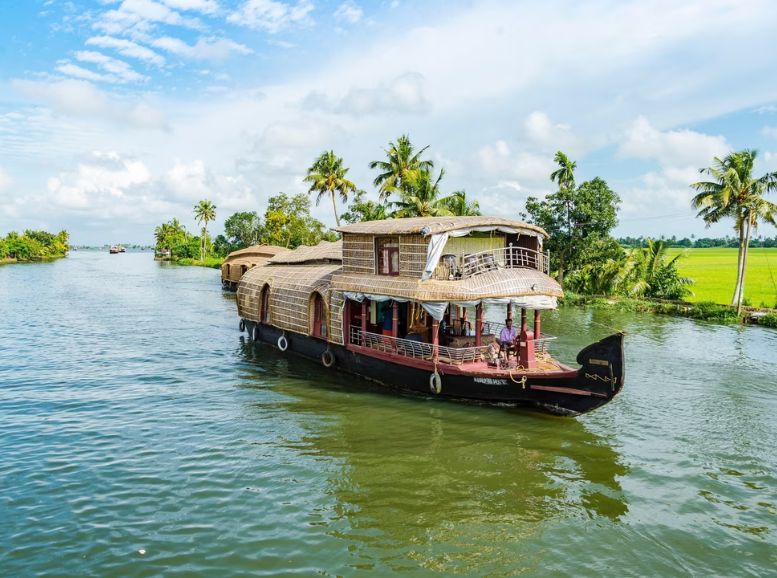

- Kathakali Performances: Immerse yourself in the captivating world of Kathakali, Kerala’s classical dance-drama form, known for its intricate makeup, elaborate costumes, and expressive storytelling.
- Traditional Artisan Workshops: Witness skilled artisans at work as they practice age-old crafts such as wood carving, pottery, and handloom weaving, preserving Kerala’s artisanal heritage for generations to come.
- Temple Festivals: Experience the colorful festivities of Kerala’s temple festivals, where age-old rituals, vibrant processions, and mesmerizing music and dance performances come together to celebrate the state’s religious and cultural diversity.
- Culinary Experiences: Indulge in Kerala’s culinary delights with hands-on cooking classes, where you can learn to prepare traditional dishes like appam, avial, and seafood delicacies, using fresh, locally sourced ingredients.
- Heritage Walks: Take a stroll through Kerala’s historic towns and heritage sites, discovering architectural marvels like Dutch mansions, Portuguese churches, and ancient temples that bear witness to the state’s multicultural past.
Travel Tips:
- Ensure essential documents, including visas, passports, travel insurance, and necessary paperwork.
- Pack smart with lightweight clothing, comfortable shoes, sun protection, and essentials for chosen activities.
- Handle local currency exchange and ensure international card compatibility.
- Choose accommodation, book necessary transportation tickets, and plan for diverse travel experiences.
Safety Tips:
- Stay Informed: Keep updated on local news and weather conditions.
- Travel Insurance: Invest in comprehensive travel insurance coverage.
- Safe Transportation: Utilize licensed and reputable transportation services.
- Water Safety: Avoid swimming in unfamiliar or hazardous waters.
- Mosquito Protection: Use insect repellents and protective clothing to prevent mosquito-borne illnesses.
- Food and Water Safety: Consume food and water from trustworthy sources.
- Sun Protection: Apply sunscreen and wear protective clothing to shield from UV rays.
- Cultural Sensitivity: Respect local customs and traditions during your visit.
- Emergency Contacts: Keep a list of emergency contacts readily accessible.
- Stay Vigilant: Remain aware of your surroundings and secure your belongings.
Conclusion:
Kerala awaits with open arms, ready to weave its emerald dreams into your travel tapestry. Pack your bags, embrace the unknown, and embark on an unforgettable adventure to India’s southern paradise. Allow yourself to be enchanted by the tranquil backwaters, mesmerized by the lush greenery of tea plantations, and immersed in the rich cultural heritage of Kerala. With every step, discover new wonders and create memories that will last a lifetime. Have a wonderful trip to Kerala! Thanks for visiting us follow Xplro for more.
FAQs:
What are some things to do in Kerala?
- Ayurvedic treatments: Rejuvenate with traditional Ayurvedic therapies and wellness practices.
- Kathakali performances: Witness this vibrant classical dance form unique to Kerala.
- Spice plantation tours: Learn about Kerala’s rich spice heritage and explore spice plantations.
- Elephant rides: Experience the thrill of an elephant ride through lush greenery (consider ethical practices when choosing providers).
- Houseboat cruising: Relax and explore the backwaters on a traditional houseboat.
What is the local currency in Kerala?
The Indian Rupee (INR) is the local currency. While credit cards are accepted in major tourist areas, it’s advisable to carry cash for smaller purchases and local transportation.
What kind of clothes should I pack?
Pack light, comfortable cotton clothing suitable for warm and humid weather. Bring a light jacket for the evenings in the hill stations, and respectful clothing for religious sites.
How do I get around Kerala?
- Taxis and auto-rickshaws: Readily available in cities and towns, negotiate fares beforehand.
- Local buses: An affordable option for intercity travel, but can be crowded.
- Houseboats: Pre-book a houseboat cruise for a unique experience exploring the backwaters.
- Rental cars: Consider renting a car for self-exploration, especially if traveling in a group.
Do I need a visa to visit this State?
Visa requirements depend on your nationality. Check with the Indian embassy or consulate in your home country for the latest information.
Is it safe to travel in the State?
Kerala is generally considered a safe destination. However, exercise common travel precautions like being mindful of your belongings, avoiding isolated areas at night, and respecting local customs.
What is the local language spoken in this State?
- Malayalam is the primary language spoken in Kerala. However, English is widely understood in tourist areas. Learning a few basic Malayalam phrases can enhance your experience.
What is the food like in Kerala?
- Kerala offers a diverse culinary experience with fresh seafood, coconut-based curries, and vegetarian options. Be mindful of spice levels if you have sensitive taste buds.
Can I drink tap water ?
- It is not recommended to drink tap water. Opt for bottled water or boiled and cooled water to avoid any potential health issues.
Is tipping expected?
- Tipping is not mandatory but appreciated in restaurants and for exceptional service.
How much does it cost to travel in Kerala?
- Kerala caters to various budgets. Backpackers can find affordable options, while luxury travelers can enjoy high-end experiences. Budget your trip based on your desired activities and accommodation level.
What are the local customs and etiquette?
- Dress modestly, especially when visiting religious places. Remove footwear before entering temples and mosques.
- Respect local traditions and customs during festivals and ceremonies.
- Be mindful of public displays of affection, as they are not widely accepted in Kerala.
- When bargaining in shops or markets, do so politely and respectfully.
- Learn basic greetings and thank you in Malayalam to show respect and appreciation.
What are some festivals celebrated in Kerala?
- Onam: A ten-day harvest festival celebrated with elaborate feasts, boat races, and cultural performances.
- Vishu: The Malayalam New Year, celebrated with colorful decorations, special dishes, and exchanging gifts.
- Thrissur Pooram: A vibrant temple festival known for its elephant processions, colorful parasols, and energetic performances.
- Theyyam: A ritualistic art form involving elaborate costumes, masks, and performances depicting stories from mythology and folklore.
What are some souvenirs I can buy in Kerala?
- Ayurvedic products: From herbal oils to soaps and spices, Kerala is known for its natural and Ayurvedic wellness products.
- Kasaragod Sarees: Handwoven silk sarees with intricate designs and vibrant colors, a prized possession from Kerala.
- Spices: Take home a piece of Kerala’s rich spice heritage with cardamom, cinnamon, cloves, and other aromatic spices.
- Coconut shell handicrafts: Decorative items and souvenirs made from coconut shells, showcasing local craftsmanship.
- Black pottery: Unique pottery from the town of Iringal, known for its black color and intricate designs.
Is it safe to swim in the beaches of Kerala?
- Swimming conditions can vary depending on the beach and time of year. Always follow safety precautions, swim in designated areas only, and be aware of currents and riptides.
What are some eco-friendly practices I can adopt while traveling in Kerala?
- Minimize plastic use by carrying a reusable water bottle and shopping bag.
- Respect the local environment by disposing of waste responsibly and avoiding activities that harm wildlife or natural habitats.
- Support responsible tourism initiatives that contribute to the local community and preserve the environment.
